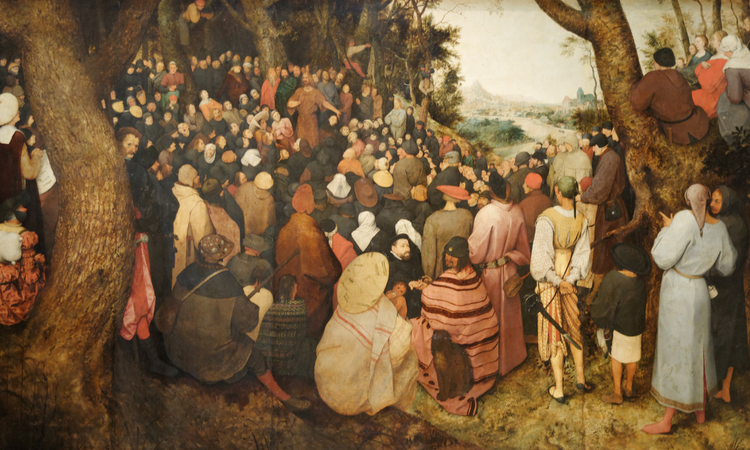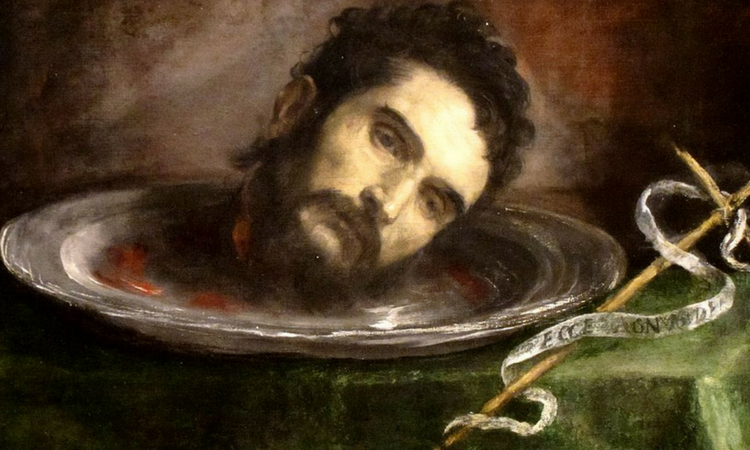A Very Merry Unbirthday To You!
There are two requirements, I’ve learned, to successful blogging: quality and quantity.
So, how is yours truly doing about a year and a half into this blogging thing? I hope you believe that the quality of what I put out is generally acceptable. Usually understandable. Mostly interesting. Sometimes even provocative or entertaining .
My real problem is quantity. I’ve put out about 45 posts over a span of over 75 weeks. You gotta’ be kidding! That’s not even one a week. I hope the only way from here is up.
The Mad Hatter And Me.
My intent was to put out a post about John the Baptist in time for his “birthday”-which many Christians celebrate on June 24. Which, to my chagrin, is now rapidly fading in the rear view mirror.
So, John, as they sang at the Mad Hatter’s party: a very merry UNbirthday to you!
John The Enigma.
There’s no question that John is a man to be reckoned with. Jesus says of him, “I tell you, among those born of women there is no one greater than John.” (Lk 7:28).
For the longest time, however, John was an enigma to me. But it wasn’t the strange stories of a wild man in the Judean desert, eating locusts and honey, clad in camel hair, that puzzled me. Odd? Yes. But straight forward enough.
Nor, during his early ministry, did I have any trouble seeing John fulfilling Isaiah’s prophecy:
“I will send my messenger ahead of you,
who will prepare your way-
a voice of one calling in the desert,
‘Prepare the way for the Lord,
make straight paths for him.'”
(Mk 1:2-3)
During those few, shining moments John’s out front where he’s supposed to be. Preaching a baptism of repentance for the forgiveness of sins to SRO crowds. Telling of the One to come, “more powerful than I, the thongs of whose sandals I am not worthy to stoop down and untie.” Even baptizing Christ, seeing the heavens torn open, the Spirit descending on Jesus like a dove. And listening in as the voice of the Father tells Jesus, “You are my Son, whom I love; with you I am well pleased.” (Mk 1:7;11)
Yes, it’s easy to see John making those straight paths.
But thereafter, aside from some brief, apparently random glimpses, John is almost entirely eclipsed by the brilliance that is the eternal Word Himself. How can John be the pathfinder, if the trail he leaves is so faint and uncertain?
Making Sense Of The Forerunner.
So what do we make of John’s other appearances? His birth? His brutal death? Even the troubling scene where, from prison, he sends his disciples to ask Jesus, “Are you the one who is to come, or should we expect someone else?” (Mt 11:2) Do we treat these events as mere surplus?
Definitely not. The key is understanding John is just like what it says: “I will send my messenger ahead of you . . .” Wherever you see John, look for Christ to show up. But later. True, John’s story, by comparison with Christ’s, is writ small. In some cases, barely a wisp. But it’s there.
Count on it: where John leads, Jesus follows.
Two Miraculous Births. And In The Right Order.
The “Christmas Story” only shows up in two Gospels: Matthew and Luke; Mark and John say nothing. Matthew is silent with regards to how the Baptist’s birth interacted with Christ’s.
Luke, in contrast, more than makes up for what the others fail to say.
In Luke, it’s clear that John goes “ahead”-he was born before Jesus. (Lk 1:57-66)
And, like that of Jesus’ birth, John’s nativity was replete with “signs and wonders.” His parents, “well along in years,” were past the age of child bearing (Lk 1:7). Elizabeth gets pregnant anyway (Lk 1:24). Angels run wild (Lk 1:11). His skeptical father is struck dumb (Lk 1:20). And then speaks again (Lk 1:64).
No, John wasn’t born to a virgin. But it’s also clear this was far from your run of the mill L&D. And that what we see through a glass darkly in John’s birth, we see face to face in Christ’s.
Two Public Ministries. And In The Right Order.

I’ve already talked about John’s public ministry: huge crowds, preaching repentance, baptism. Very explicitly pointing to the One who is to soon come. What else can be said?
Probably no more than this pithy summary in the Gospel of John at the close of the Pathfinder’s public ministry: “He (Jesus) must increase, I must decrease.” (Jn 3:30).
Two Gethsemanes. And In The Right Order.
As those paragons of Christian theology, Mick Jagger and Keith Richards, put it, “I was ’round when Jesus Christ had his moment of doubt and pain.” But, to our everlasting gain, Christ’s response to Lucifer in the garden was, “Father, if you are willing, take this cup from me; yet not my will, but yours be done.” (Lk 22:42)
But Christ’s moment of doubt and pain was, again, foreshadowed by John. His public ministry came crashing down when he told King Herod that “It is not lawful for you to have your brother’s wife.” (Mk 6:18). Herod was no doubt upset, but his wife, Herodias, was furious. So she persuaded her husband to have John thrown in the slammer. (BTW, if you’d like to get a sense of what prison conditions in the ancient Mideast may have been like for The Baptist, watch the gut wrenching movie, Midnight Express.)
From the inky depths of Herod’s prison, John is likewise in Satan’s icy grip. Wondering how something that had begun so well could have gone so badly so quickly, he sends some of his disciples to ask Jesus, “Are you the one who was to come, or should we expect someone else?” (Lk 7:19). How ironic, but understandable, that The Pathfinder would have his own moment of doubt and pain right after his disciples had reported that Jesus had pulled back the centurion’s servant from the jaws of death. And raised the widow of Nain’s son from the dead (Lk 7:1-15). John’s anguished prayer can almost be heard: “Lord, you healed the centurion’s servant. You raised the widow’s son from the dead. Why don’t you get me out of Herod’s prison?”
Two “Trials.” And In The Right Order.
But Herodias wasn’t satisfied with John merely being held in a wretched dungeon. She wanted his head. But Herod resisted; for some reason he took a perverse pleasure in listening to John (Mk 6:20).
But that resistance melted away in the face of incestuous lust. At a drunken birthday party, Herodias’ daughter’s dancing so pleased Herod that he promised her anything, even “up to half my kingdom.” After consulting her mother, the daughter demanded “the head of John the Baptist on a platter.” Unwilling to back down in the presence of his guests, Herod ordered it done. He, in turn, “presented it to the girl, and she gave it to her mother.” (Mk 6:21-28) Talk about a grizzly party favor. And one that still lives in infamy.
Does this travesty rise to the level of a “trial?” Obviously not. But neither did Christ’s. And, again, Jesus followed where John led.
A Coincidence? You Decide.
To me, the most poignant account of John’s disciples telling Jesus of the beheading in Herod’s dungeon comes in Matthew: “When Jesus heard what had happened, he withdrew by boat privately to a solitary place.” (Mt 14:13). What was Jesus doing in that solitary place? Praying? No doubt. Mourning? Sure.
But let me suggest one more thing: pondering his own fate.
It is only after John is murdered that Jesus begins predicting his own death. (Mt 16:21; but also true in the other synoptic gospels). A coincidence? I doubt it. Surely, by now, Jesus saw the pattern himself, as certain as night follows day: where John leads, I must follow.
Two “Resurrections.” And In The Right Order.
What more can possibly be said of Christ’s death and resurrection? These events are the cornerstones of Christianity. They’re the culmination of all four gospel accounts. Who could miss them?
The same, most certainly, can’t be said of John’s “resurrection.” By contrast with Christ’s, it’s the barest wisp.
Why? Consider the source: Herod. That’s right, John’s murderer. But it’s there:
“At that time Herod the tetrarch heard about the reports about Jesus, and he said to his attendants, ‘This is John the Baptist; he has risen from the dead! That is why miraculous powers are at work in him.'” (Mt 14:1-2).
Is Herod a reliable source? No. He was more likely suffering from a guilty conscience. Had John come back to life in Jesus and was he performing the miracles Herod heard about? Again, no.
But it’s only after Herod’s delusional “prophesies” that Jesus begins predicting his own resurrection. (Mt 16:21). And if Herod’s ravings about John are good enough for Jesus, they’re plenty good enough to demonstrate to me that Christ was paying attention. And following where John was leading.
But that’s not really the point. John wasn’t meant to be the highway, plain for all to see. Jesus was. John was the path. For Jesus to see. John’s “resurrection” is just the next paving stone in the path.
It’s Not If. It’s Who.
“For we do not have a high priest who is unable to sympathize with our weaknesses,
but we have one who has been tempted in every way, just as we are-yet was without sin.” (Heb 4:15).
This is an interesting, two edged passage of Scripture. Sure, it means that Christ is just like us-except without sin. But it also means that we are just like Christ-except with sin. Granted, that’s a huge difference. But, as I take it, there are also huge similarities.
In relation to The Baptist, consider what the author of Hebrews meant. Did Jesus really need a leader? Unless we are to conclude that the carefully woven skein between the lives of John and Jesus was just play acting, how can it be otherwise? And isn’t this just like the Lamb of God? To humbly submit to the Pathfinder’s leadership. Even after John’s reckless enthusiasm was reduced to bitter ashes in the furnace of Herod’s prison.
And if Jesus needed a leader, how much more us? But the difference? While Jesus chose just the right leader and played the game flawlessly, we’re free to err in both regards. And how often we do.
But our consolation? If we, like Christ, humble ourselves and choose the right Leader, He has our backs. Because, with even greater recklessness, the Lamb humbly stoops beneath even us, making
“. . . himself nothing,
taking the very nature of a servant,
being made in human likeness.
And being found in appearance as a man,
he humbled himself and became obedient to death-
even death on a cross! (Php 2-7,8).
To what end? To rise to heights of unimagined glory. And, bearing on His broad shoulders all those who also humble themselves, climb aboard, and go along for the ride.





Spencer
Excellent! Will reread and contemplate and use.
Ken
Get Outlook for Android
________________________________
Ken. Thanks. Look forward to seeing you next Saturday.
My profound thanks for your insightful comparison, so cogently and vigorously written.
Peg
Thanks so much. Great to hear from you. Best to you and George.